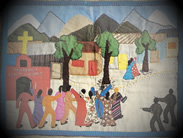 |
Julie Shayne, Ph.D. Gender, Women, and Sexuality Studies |
 |
|
|
||||||||||
|
Taking Risks: Feminist Activism and Research in the Americas Taking Risks is my passion project; I have wanted to edit/write/collaborate on some version of this book for at least twenty years. The contributors to Taking Risks envision our collection in dialogue with activist scholarship and transnational feminist methodologies, using stories as the bridge between the two. We listen to stories in the forms that activists/intellectuals represent them: texts, performance, and activism. After a foreword by Margaret Randall, we open the book with a monument recognizing a 1955 massacre of Argentine civilians at the Plaza de Mayo. Artist Nora Patrich's brief description of the massacre and her memorial remind us of the importance to archive stories and teach history in the venues to which we have access. Section one looks at stories as represented through textual articulation. Chilean writer-activist Carmen Rodríguez begins the collection by speaking to the power of fiction as a form of activism. She explains how writing, particularly against revisionist histories, is an act of resistance. Next, Mahala Lettvin looks at activist writing from the reader's perspective. She uses the case of the Argentinian dirty war as documented through fictional texts and memorials to articulate reading as activism. I then look at a feminist magazine produced by Latina exiles (including Carmen Rodríguez) in Vancouver, British Columbia. These feminists created the magazine to articulate and communicate the political and artistic accomplishments of Latinas in and outside of their homeland; the pages are thus replete with stories. In this section's final chapter, Marisela Fleites-Lear talks about stories of literacy and literature through her analysis of underground libraries in Cuba and award-winning Cuban "desk drawer novels." Section two is about performed stories. Tamera Marko opens this section with a discussion of a transnational, collaborative documentary project based in Medellín, Colombia, where women tell their stories of the reconstruction of their city. Next, Robin Garcia takes us to Venezuela to learn about community radio and television projects and the stories Venezuelan media activists are telling about their experiences with the Bolivarian Revolution. Christina Marín closes the section with a discussion of traumatic stories of femicide along the Juárez/U.S. border as articulated through three plays she has directed. The third section addresses stories of grassroots activism. Erica Williams opens the section with a discussion of the conflicts in Bahia, Brazil, between sex workers and their advocates, and abolitionist approaches to sex work. In a related discussion, Roberta Villalón's work in Texas conveys the challenges for Latina immigrant survivors of intimate partner violence and the restrictions often placed upon advocates working to further their rights. Finally, Shelly Grabe closes the section and examines the activist efforts of the Women's Autonomous Movement in Nicaragua vis-à-vis the testimonies of two feminist leaders in the movement. Kristy Leissle and I conclude the chapters with a brief discussion of interdisciplinary spaces, cultural capital, and activist scholarship. Taking Risks closes with an afterword where I speak to the family-career divide and its risks, based on my own life changing experience in the academy; an experience which ultimately provided me the space to pursue this passion project. You can find reviews of Taking Risks here:
Please help me spread the word about Taking Risks by sharing this link with your friends, colleagues, and librarians:
|
|
||||||||